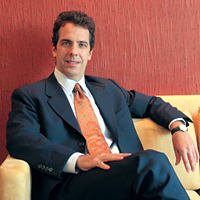| |
 |
| |
Skillfully
raising and retaining assets lets Anthony Faillace create
value for his clients in the financial industry. |
| |
|
The
one risk CIO Anthony Faillace '94 wouldn't take is dodging
risk altogether
By
achieving exemplary success in the financial industry, Anthony
provides a leadership example for all Kellogg alumni.
by
Kari Richardson
When
Kellogg School graduate Anthony Faillace '94 and business
partner Steve Luttrell started their own money management
firm in 2001, Faillace knew the company needed to get off
to a good start — and fast.
"Our
business is pretty straightforward," reflects Faillace,
chief investment officer of the resulting Drake Management
Co. "It's 'can you raise and retain assets and effectively
manage them?' We needed to raise enough assets to build a
track record on and then we needed to be able to perform on
them."
After
years of working in the international fixed-income field,
first at Pacific Investment Management Co. and then at a competitor,
BlackRock, Faillace saw lots of potential niches ripe for
entrepreneurship. But success, he figured, would take equal
parts skill (planning and execution) and luck (a cooperative
market). Even the best asset managers hit the occasional rough
patch.
"We
knew the risks," he recalls. "If you are new and
you have a bad year you will probably close. We had to live
with the risk that we would draw the black bead that first
year."
It
turned out that Faillace and Luttrell had timed their foray
into entrepreneurship to coincide with the bursting of the
Internet bubble. Their first year investing in the market
was 2002, when months of precipitous declines in stock prices
following the Sept. 11, 2001, terrorist attacks became the
new market norm. Still, Drake Management's hedge fund was
up 8 percent that year — a coup considering one of Faillace's
former employer's funds had lost 10 percent during the same
period.
"That
first year put us in a position to really be able to grow
our assets in the next couple of years," Faillace says.
"We would have been less able to take advantage of the
expanded hedge fund market if we hadn't experienced that success
early on."
Today,
Drake Management has some $5.75 billion under management in
its three hedge funds and another $4 billion in its traditional
long-only investment strategies. The company's clients are
pension and endowment funds, Japanese institutional funds,
and intermediaries who aggregate hedge fund investments for
high-net-worth individuals worldwide. The company, Faillace
says, uses a portfolio management model, in which a chief
investment officer, with the help of several sector specialists,
oversees each fund.
With
those critical first years safely behind him, Faillace is
thinking about the next phase in his company's lifecycle —
something his Kellogg School education has prepared him for:
"Kellogg helped me think strategically about how to manage
a business," he says.
With
97 employees and an already-strong international operation,
Faillace and Luttrell plan to expand Drake's global reach
further in 2008 by opening research offices in Brazil, Turkey
and India, as well as in some yet-to-be-named developing countries.
Employees in these local offices, Faillace believes, will
provide meaningful research about macroeconomic trends shaping
those countries, where opportunities are potentially greater
than in the United States and Europe.
"It's
fairly challenging to produce returns that meet expectations
and are superior to your competitors'," he says. "As
we've grown, it's become incumbent upon us to become good
managers, to allow the people working with us to maximize
their own talents and abilities."
Though
risk is inherent in the market, Faillace says the biggest
career risk would have been avoiding entrepreneurship altogether:
"I never would have forgiven myself if I hadn't tried
this. I could have lived with trying, making a mistake and
failing, but I couldn't have lived with not trying."
|



